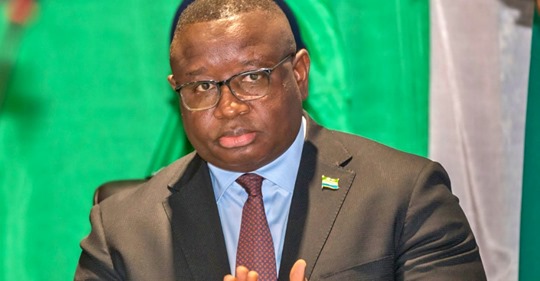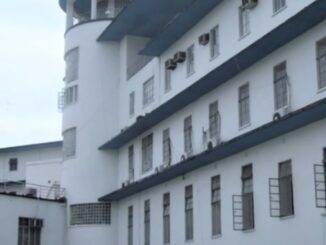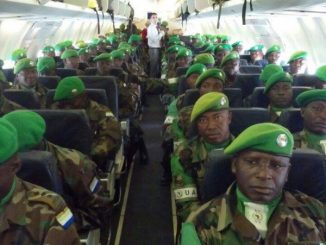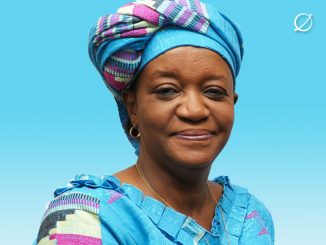
By Chernoh Alpha M. Bah and Matthew Anderson
Protests, social unrest, violence; these symptoms do not appear in a society without a cause. When democratic expression is repressed, when the voices of oppressed people are suppressed, and when state violence becomes unbearable, the end products are social unrest and mass protests. Today’s crisis in Sierra Leone is no exception. In his widely broadcast message on May 8, Julius Maada Bio, the president of Sierra Leone, described the ongoing violence in the country as acts of “terrorism”, blaming it mostly on opposition members and their supporters.
“Protest is the language of the oppressed,” said Martin Luther King Jr., the iconic American civil rights leader at a time when millions of African Americans were taking to the streets to protest worsening poverty, police brutality, and the discrimination against blacks in the United States during the 1960s.

In some cases, the US civil rights protests turned violent, resulting in extensive property damage across major US cities. Even so, the heavy-handed response of US federal and local authorities to black protesters, including the murder of 30 civilians by police and military officials in the Detroit riots of 1967, for example, were rightly considered unjust, immoral, and anti-democratic. Indeed, not all violence is the same. Nor is expressed defiance of governmental policy equal to treason or terrorism. Throughout the struggle for the rights of African Americans in the 1950s and 1960s, the US federal and state governments tried strenuously to justify violent repression of protesters and activists by labeling them as “terrorists”, “criminals”, “communists”, and “provocateurs.” But men and women who are drawn into the streets out of desperation because of the threat of state repression, of arbitrary arrests, and of police brutality, are not terrorists. Even while the destruction of property by such protesters may be regrettable, it is not equivalent to the violence inflicted by a government, well-armed and powerful, against civilian citizens. Nor are police beatings and killings justified in such an instance even where the claim is supposedly in the defense of life and property. When a populace is confronted with state violence, people often resort to mass protests and resistance. Indeed, it is nothing new for authoritarian governments to label all opposition, including legitimate opposition, as “terrorists”. There is a long history of anti-democratic regimes resorting to such cynicism, from Apartheid South Africa locking up Nelson Mandela in prison for 27 years for supposedly being a “terrorist”, to the arrest and murder of activists and journalists opposed to Siaka Steven’s one-party rule in Sierra Leone during the 1970s and 1980s.
Sadly, authoritarian regimes, especially newly emerging authoritarian democrats in most parts of the world, have often quickly labelled active civilian opposition groups as “terrorists” when they cannot win the national debate and conversation on public policy. Such anti-democrats willfully ignore the root causes of social unrest and economic depression that drive protests and resistance in the first place. Despotic leaders throughout history, whether they are from the army or from political parties, have always justified state violence and anti-democratic policies in the name of maintaining law and order and national security.

It is with this historical context of the nature and character of dictatorial governance that we must consider the crises in Sierra Leone today. We must begin by asking the question: why has random violence become a regular feature of Maada Bio’s presidency in these two years? Most especially, when did this actual random violence and youth protests commence and why have they continued unabatedly?
Within one week alone, there have been three recent incidents of violence and bloodshed across several parts of the country: the mass killing of prisoners at Freetown’s Maximum Prison and two other separate youth protests, in Lunsar in the north of country and in Tombo in the outskirts of Freetown. These violent events have similar features – they are all characterized by deaths and direct confrontation with armed troops of the Sierra Leonean state – the police and the military. In the prison incident alone, more than 60 deaths – mostly of unarmed prisoners – have been reported by eyewitness accounts. And in Tombo and Lunsar – as in the Freetown Prison – public infrastructure was equally set ablaze. Police stations and houses owned by local community leaders perceived to be state allies were also targeted by aggrieved youngsters.
But what is most important in this context is the response of the Bio regime to these events. Many in government have casually described the ongoing youth protests as “riots by lawless youth.” They have even gone as far as ascribing them to “hate messages” allegedly spread on social media by defeated opposition elements. Some ruling party supporters and government spokespeople even claim that the ongoing violence is sponsored by Ernest Koroma and APC opposition politicians. They allege that Koroma and the defeated APC leadership are resisting Maada Bio’s pending Commission of Inquiry White Paper that is expected to exclude key APC politicians from future elections or from holding public office. But the government has failed to acknowledge what actually precipitated the youth responses witnessed in Lunsar and Tombo. Youths do not begin to protest simply because some former opposition politicians with nothing to offer them (nor significant popularity to speak of) tell them to. No, the recent youth protests are a symptom of a country deeply entrenched in political and economic crisis; a crisis that has reached its apex during a raging disease pandemic, and a crisis that has been punctuated by state violence throughout. Protest events, like these, have been witnessed across many countries on the African continent where citizens – from South Africa, Uganda, Burundi, Nigeria, and Congo – have protested against the hardship of violent lockdown measures.

What those concerned about the ongoing violence in Sierra Leone have failed to consider is the state’s own role in the origin of this chain of violence. They have ignored how at the first sitting of the newly elected parliament in April 2018, riot police stormed parliament and forcibly removed opposition members of parliament who were, by the results of the 2018 elections, the majority in parliament. Having removed the majority opposition party in parliament, ruling party politicians hurriedly, and in a questionable and illegal process, imposed a Speaker of Parliament who was not even from among the elected MPs, but whose political record has been the subject of two judicial processes from the days of Tejan Kabbah and Ernest Bai Koroma.
That forceful imposition of a parliamentary Speaker, the Deputy Speaker, and Clerk was the initial inauguration of state violence orchestrated by ruling officials bent on ensuring that the SLPP, and eventually the Bio regime, will command control of parliamentary processes despite being the minority political party in parliament. Ruling party supporters and their leaders celebrated this parliamentary coup against the popular will of the people. They justified that violent beginning of the Bio regime as a representation of political tactfulness. What they failed to understand was that by that singular action alone, Bio and his new squadron in power had set in motion a violent train whose gushing flames would eventually be fueled by the resistance of the constituents whose representatives were brutalized and humiliated by coercive agents of the executive.
Following that fratricidal and shocking beginning of parliament, ECOWAS (which had played a crucial role in mediating the elections of 2018 that brought Bio to power) dispatched a fact-finding mission to Sierra Leone. SLPP leaders ignored the recommendations of the ECOWAS parliamentary delegation and moved their attack against the opposition majority in parliament by further use of the judiciary to force ten opposition MPs out of parliament. This use of crooked judicial precedents, which run against the primary legislative instruments of the country, were part of ruling party efforts to fully control the three tiers of government – the executive, judiciary, and the legislative arm – against the popular electoral will of the greater majority of citizens as expressed in the elections of 2018. These two state-orchestrated violent events are the principal triggers to other state orchestrated violence that escalated across the country over the last two years. Supporters of this state violence – who are mostly ruling party supporters and their new employees – must now recall how nearly a year ago, on May 31, 2019, when dissatisfied opposition supporters who had gathered at their party headquarters to protest the controversial court removal of ten APC MPs were attacked and teargassed by police troops. Images of these violent scenes were relayed by live television broadcasts across Sierra Leone and beyond.

These state sponsored violence and terror did not stop at the gates of parliament and the judiciary. Its extensive arm reached into the electoral terrain as well. Supporters of state violence must also be reminded the way ruling party agents and thugs, under instruction from SLPP leaders, interfered in the August 2019 by-election campaign in Constituency 110. They kidnapped one Ibrahim Conteh at the village of Hamilton, drove him to the home of the SLPP candidate, tied him up and tortured him to near death. The violent scene of this incident, which occurred right in front of SLPP constituency leaders in that area, was also filmed by phone camera showing the agonized victim in pain and blood while pleading with ruling party gangsters for his life. That notwithstanding, on the very day of polling in that constituency, officials of the ruling SLPP, including a cabinet minister and party thugs, stormed polling centers and destroyed voting materials, forcing a cancellation of the elections. This was done when it became clear that the SLPP was facing electoral defeat in that by-election despite unleashing all its brigades of violence during the campaigns and after arresting and unlawfully detaining opposition party organizers ahead of the polls. That cancelled by-election has not been slated for electoral competition ever since it was annulled nearly a year ago now. A similar version of electoral violence was equally unleashed in the Tonko Limba local council election in September 2018. Let the SLPP supporters now condemning “youth violence” also recall June 30, 2019, when thugs representing two SLPP factions – of the party chairman Prince Harding and Jimmy Batilo Songa – engaged in a fierce fight in their party office in Bo resulting in the disruption of traffic and the destruction of property. Let them also recall in that same month of June that armed police equally stormed a village in Mile 91 and killed, in cold blood, a local village farmer on the pretext that he was farming marijuana.
No arrests of the known perpetrators in these incidents were carried out because the violence served the political interests of ruling party politicians. Indeed, the irony of the sudden condemnation of violence from the SLPP leadership stems from the fact that the violence committed by the ruling party since Bio assumed power has gone without condemnation from the presidency and the ruling party’s leadership. The result is a growing atmosphere of fear and repression in the country, where the state and SLPP leadership can commit violence with impunity, while simultaneously arresting and brutalizing anyone brave enough to speak out.

No arrests of the known perpetrators in these incidents were carried out because the violence served the political interests of ruling party politicians.
Foreign embassies in Sierra Leone and the few remaining voices of democracy in the country have repeatedly spoken out against these rising trends of violence and despotism orchestrated by ruling party officials and their supporters. By all accounts, genuine democratic voices in both civil society and the independent media can no longer raise their voices in the prevailing toxic political environment under Bio because they have become afraid of the overt and covert reprisals that often accompany any form of dissent against the evolving climate of repression in the country.
The truth that needs to be told to the community of civilized nations is that there has been a massive crackdown on civil liberties, especially the right to free expression and the right to political association since Bio assumed power, despite the constitutional guarantees provided by the multi-party constitution of Sierra Leone. Independent journalists, in particular, have come under attack for exercising their right to free expression. These attacks include the case of two female journalists who were beaten by presidential guards at the national sports stadium in Freetown in full glare of leading officials in the government. When news of the incident appeared in the public domain, ruling party officials initially defended the violence of the presidential guards by seeking to label the victimized journalists as “opposition elements”. The state was eventually forced to apologize and pay a paltry compensation to the victims due to concerted pressure from the press union and a cross section of civil society. Several other journalists have experienced similar harassment. A journalist working for the national television was recently dismissed because of a Facebook message he posted that appeared to praise a former minister in the previous government. The list of media harassment includes the recent violent beating of Faya Amara Faya by military forces. The escalating environment of violent repression of legitimate grievances, the suppression of press freedom, and the violation of electoral processes are what leads to mass protests and social unrest. This is exactly why youths are protesting across towns and villages in the country. The casual and blanket labeling of those a government disagrees with as “unpatriotic,” “terrorists,” and “thugs”, sets a dangerous precedent and has always been used by despotic leaders who are eager to justify further state violence and political repression against opponents in a competitive democracy. Indeed, this rhetoric by SLPP elites follows a dangerous historical pattern that fosters the erosion of democracy and respect for human rights.
All activists, journalists, and genuine pro-democratic voices from all political parties and wider civil society must reject the cynical rhetoric expressed in Maada Bio’s recent speech, which represents nothing short of a state project to criminalize free speech and opposition in a competitive multi-party-political environment. We, as a society, and as freedom loving human beings, must reject all forms of state orchestrated violence, even if it is perpetrated in the interest of our friends and political allies. Silence in the face of the ongoing crackdown on democratic values – the criminalization of right to free speech and the right to political association – risks turning all genuine democratic voice into direct and indirect accomplices in the ongoing consolidation of a hegemonic dictatorship in the name of enforcing the rule of law in Sierra Leone.
—
Editorial note: This article is part of an ongoing series on rising state violence and authoritarian democracy in Sierra Leone. The next essay will examine question of state violence as it relates to the right to employment and institutional governance under the Bio regime.




